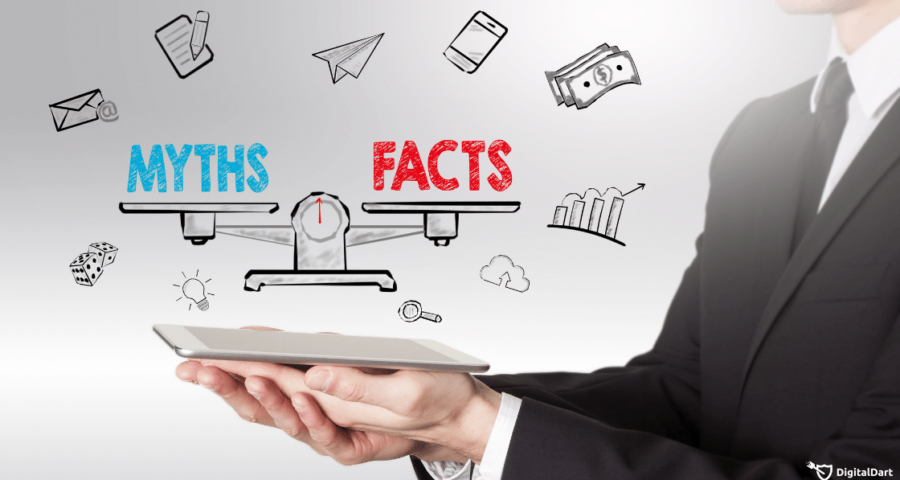VPN, which represents Virtual Private Network, is a significant and progressively well-known application software that works with a connection over the web between a client and a private server.
The VPN was initially developed out of a requirement for establishing secure connections and network access.
Over the long haul, this application software has become more commonly utilized by non-corporate clients to access the web, preventing ISPs and other ill-minded people which are anxious to track what the client is doing on the web and sell the browsing data.
While VPNs are without a doubt an incredible and powerful security tool, they come too with limitations. In this article, we will feature various misconceptions and myths related to VPN, and put any misinformation to rest on these issues.
Myth #1 : Using VPN is Illegal
This is one common misconception but it is only partly true. VPNs are for sure illegal in nations with heavy restrictions on online surveillance and censorship. Since a dependable VPN permits clients to keep away from the inside and out, government organizations in these nations prohibit utilizing them.
So VPN is only illegal to use where the government has imposed a ban on VPN because of censorship issues. So carefully check the laws and make sure that using VPN is legal in your country, you can easily use it without worrying about anything.
Myth #2 : VPN slows down your internet connection
Since a VPN sends your traffic on a bit of re-route it needs to travel farther than it would without a VPN. That implies your traffic is slower, yet that doesn’t mean it must be recognizably slower. Most VPN suppliers offer you the decision to pick a server close to you, which makes traffic re-route quicker.
Likewise, encrypting and decrypting information takes time. Notwithstanding, there is an advantage to utilizing a newer generation VPN with modern and latest encryption-decryption rather than using older VPNs. The VPN service has worked on throughout the years and VPNs have become much faster, reliable, and very much efficient as compared to earlier.
Myth #3 : Only programmers and hackers use VPN
This is one of the most common and popular VPN myths.
Only hackers, programmers, or computer science students use VPN, yet they’re a long way from the ones in particular who benefit from online security and protection. Here are some of the different groups of individuals who consistently benefit from VPNs:
- People who keep traveling and have to connect to public Wi-Fis very often.
- Exchange students or foreign students who have to stay in another country, have to use VPN to bypass geo-blocking when they are in their own country.
- Any common internet user who knows the importance of using VPN and values his privacy online.
- Company professionals, you have to access and have to transmit the sensitive and valuable data.
- Sometimes journalists use VPN too for their research work without having
Myth #4 : I don’t need a VPN when I am using mobile
Another common one among VPN myths is that certain individuals think they just need a VPN on their PC. Yet your mobile phone presumably holds more data about you than any other gadget you own.
If you connect with public Wi-Fi on your mobile phone, a VPN shields you from cybercriminals who keep an eye on other users within the network. Hackers are privy to your information and can tamper with it too. Meaning, your system may become infected with malicious software. So a VPN is a very basic tool to secure yourself on open Wi-Fi either on your laptop or on your mobile phone.
Something else to remember is that an ISP can track what you do on the web. They’re able to see the sites you visit, and even how long you spend on those websites. Assuming, however, if you utilize a VPN on your mobile phone, all that you do online is stowed away from your ISP, giving you back your privacy. Here’s how you can protect your identity while browsing social media sites.
Myth #5 : VPN provides Complete Anonymity
Since VPNs are intended to jumble client data, numerous clients expect that VPNs provide complete anonymity to the user and data is protected from end to end.
A VPN does not provide complete anonymity!
It only masks your original IP address to some other IP from some different server. But this doesn’t mean you have achieved complete anonymity by this process.
Myth #6 : No Data is collected by VPN
Since VPN tunnels secure data, clients may likewise expect VPNs to not gather information. This isn’t exact for all VPNs available in the market.
Since VPN operates at the IP layer, some of them usually collect IP addresses, dates, time zone, and duration of your session on the internet. Some of the VPNs may likewise gather the number of bytes sent and get over the connection.
In the meantime, some modern VPN services can fetch and offer customer information — like browser version, OS version, or about the user’s anti-virus and other software installed in his system.
So we busted some common myths which revolve around VPN. We highly recommend you use VPN when using the internet. There are many VPNs in the market which are easy to set up and also pocket-friendly. But we highly suggest the Digital Dart VPN service. They provide fast and secure service. It is lightning fast and has best-in-class encryption.


Leave a Reply